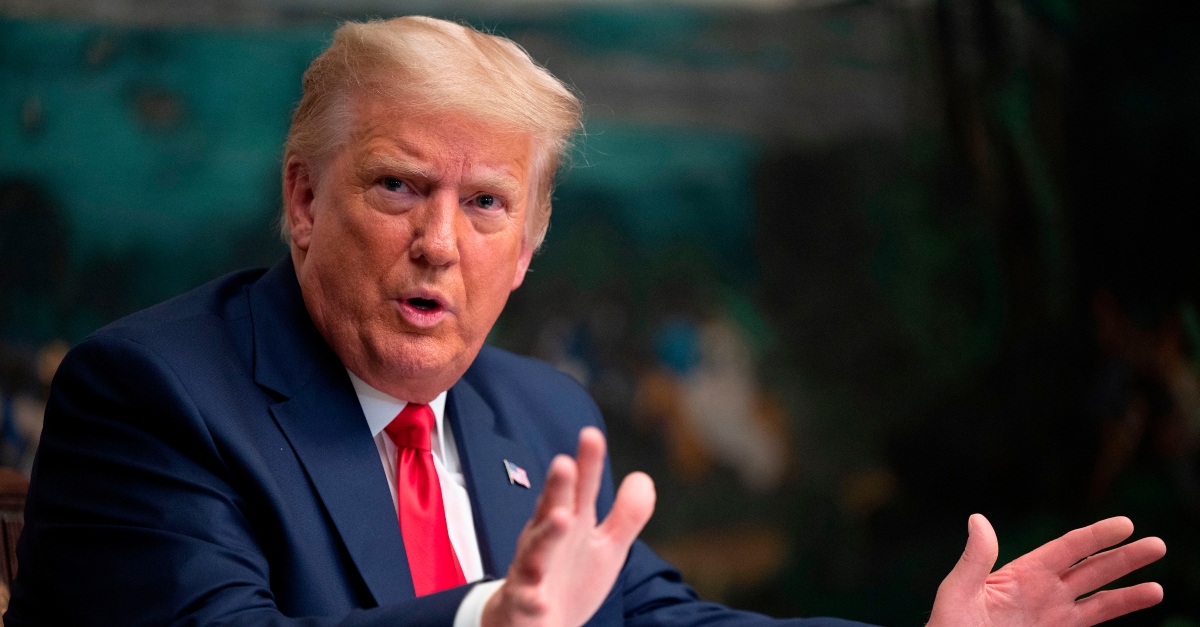
Since there’s no recognized and binding “misconduct exception,” the National Security Agency does not need to disclose a memo of a 2017 phone call during which then-President Donald Trump asked the agency’s director if the director could help refute news stories connecting Trump to Russia, a federal appeals court ruled on Tuesday.
In a 21-page decision, a three-judge panel on the U.S. Court of Appeals for the D.C. Circuit unanimously ruled that the memo was exempt from disclosure under the Freedom of Information Act (FOIA) on the basis of the presidential communications privilege. That privilege exists to allow presidents and their advisors to freely explore different alternatives and express opinions in the policy-making processes that they may only be willing to do in private.
“Our own in camera review of [the memo] confirms it was properly withheld pursuant to FOIA Exemption 5,” U.S. Circuit Judge Cornelia Pillard, an appointee of Barack Obama, wrote for the court. “The Memo memorializes a phone call that was initiated by the President in which he discussed and sought information relevant to his deliberation over issues connected to foreign relations and intelligence-gathering. Such a document falls squarely within the scope of the presidential communications privilege.”
On April 21, 2017, the government watchdog group Protect Democracy sent FOIA requests to the Justice Department and intelligence community seeking documents related to the Russian government’s interference with the 2016 election. The requests also sought communication between the White House and members of Congress pertaining to the investigation into Russian election interference.
The requests sought to advance the story that would eventually ended up being mentioned in a partially redacted version of the Mueller Report. The special counsel confirmed that following former FBI Director James Comey’s firing, Trump called NSA Director Mike Rogers and said “the thing with the Russians was messing up” his ability to work with the Russian government.
“The President also said that the news stories linking him with Russia were not true and asked Rogers if he could do anything to refute the stories,” the Mueller Report stated. “Deputy Director of the NSA Richard Ledgett, who was present for the call, said it was the most unusual thing he had experienced in 40 years of government service.”
Ledgett then authored the memo summarizing the call.
In 2018, Protect Democracy narrowed its FOIA request to include any memo written by senior NSA officials about a presidential conversation with senior NSA officials “in which the White House asked the NSA to publicly dispute any suggestion of collusion between Russia and the Trump campaign.”
The administration refused to produce the document and Protect Democracy sued for access. A federal district court sided with the administration, ruling that the memo was properly withheld under the presidential communications privilege. The court also denied the watchdog group’s request to examine the memo for any passages that could be segregable from the document and rejected the notion that the government’s publishing of a description of the memo in the Mueller meant it had waived its privilege.
The Circuit Court upheld the lower court’s ruling, writing that “records of what was said by or directly to the President lie at the heart of the presidential communications privilege.”
The Circuit Court also rejected Protect Democracy’s assertion that the court should make a “narrow exception” and require portions of the memo to be segregated and disclosed if there are credible allegations that a privileged communication “contains information manifesting governmental misconduct.”
“There is no precedent binding on this court that recognizes the misconduct exception Protect Democracy proposes,” the ruling stated. “Protect Democracy insists that, in asking us to craft a special segregability rule in cases involving credible allegations of misconduct, it does not seek to overcome the privilege—it seeks access only to those parts of a record that are not privileged. But insofar as the memo is protected— meaning privileged—in its entirety, any effort to render the document segregable necessarily amounts to an effort to overcome the privilege.”
Read the full ruling below.
[image via ANDREW CABALLERO-REYNOLDS_AFP via Getty Images]